Ducks and chickens are similar in terms of care, but what to feed ducks might vary from chicken diets. So, let’s take a look at what ducks eat in the wild, what you should feed domesticated ducks, and how to keep your feathered friends healthy.
What to Feed Ducks
Ducks eat a wide variety of foods, and their dietary needs depend on their breeds. In captivity, ducks can eat a feed similar to chickens, but in the wild, their nutrition will differ. So, let’s look at what ducks eat, depending on how they live.
What Do Wild Ducks Eat?
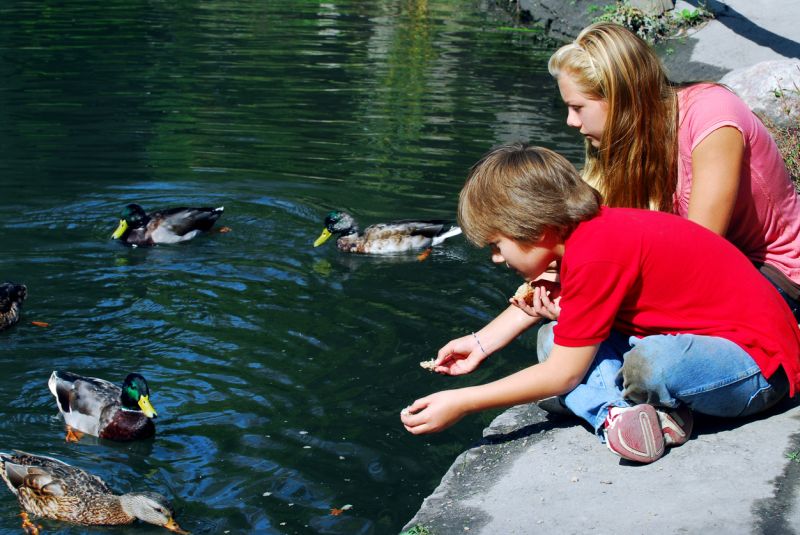
Most wild ducks are considered either divers or dabblers. Divers are ducks that swim below the water to search for food. Dabblers wait at the edge of the water and eat what they can reach from the shore.
The majority of what divers collect is plants and crustaceans. Dabblers also search for plants, roots, and small creatures hiding in the mud. Some ducks will also explore away from the water to collect berries and grains.
Ducks are considered omnivores. Here’s a list of common things they’ll consume in the wild:
- Water plants
- Leaves
- Roots
- Grass
- Berries
- Seeds
- Snails
- Fish eggs
- Small fish
- Earthworms
- Salamanders
- Slugs
- Tadpoles
Ducks can use their beaks as a shovel to sift through mud near the water. They don’t have teeth, but they have bristles along the edge of their bills. That way, water can be filtered out while plants and critters stay trapped in their beaks.
What Do Wild Ducks Eat in the Winter?
It can be a bit harder for ducks to find food in the winter. No matter the season, they will forage during day or night to find food. Since winters are harsh for many breeds, some ducks migrate to warmer areas so they can still find food in the water.
Ducks that only dabble usually don’t migrate for the winter. Ducks have lots of fat and feathers, which allow them to stay comfortable during frigid temperatures. However, since they can’t get under the frozen water, they are restricted to only what they find on land.
Most ducks will eat extra food in the fall to prepare themselves for winter. That way, even if food is scarce, they can survive. Ducks that rely on diving often pass away in the winter if they can’t find enough to eat.
What Do Domesticated Ducks Eat?
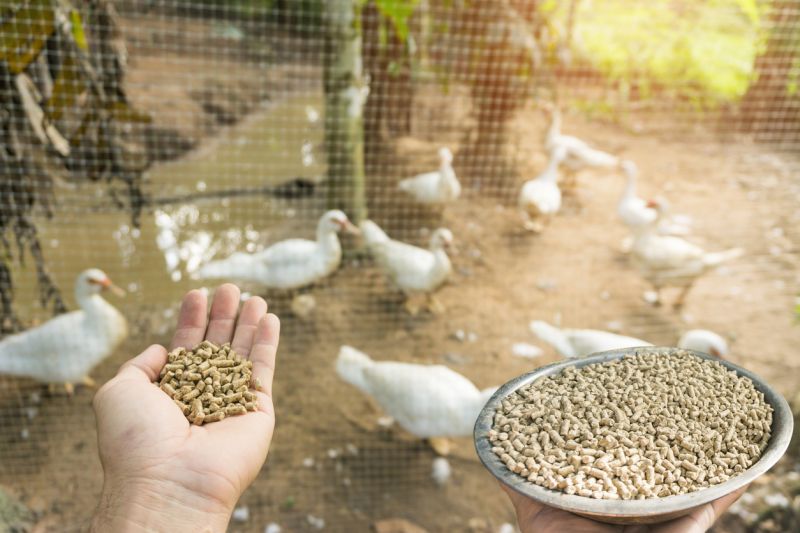
Domesticated ducks don’t eat as much variety as wild ducks do. Yet, their diets are consistent year-round since food is always supplied to them. Most ducks in captivity need a duck feed, which is very similar to chicken feed.
However, many keepers allow their ducks to forage too, like chickens do. When ducks forage, they might eat things like grass, bugs, plants, and slugs. Allowing ducks to forage not only gives them additional nutrients, but it also helps remove pests from your property.
In addition to their normal meals, you can also give your ducks snacks like fruits, vegetables, grains, and berries.
What Do Ducklings Eat?
Ducklings in captivity can eat duck feed like adults, but their feed should be specialized for their age. Most duckling feed consists of extra protein to support their rapid growth. Adding lots of brewer’s yeast to the food is great for the development of ducklings.
The ideal feed for ducklings is a crumble with 20% to 22% protein. It’s a good idea to mix the feed with water and then mash it up to make sure the baby ducks don’t choke on it. They should also have access to fresh water at all times, just like adult ducks should.
As ducklings get older, you’ll need to slowly transition them to a feed with less protein. By 20 weeks old, they can eat a feed that only has 16% protein.
Food You Should Never Feed Ducks
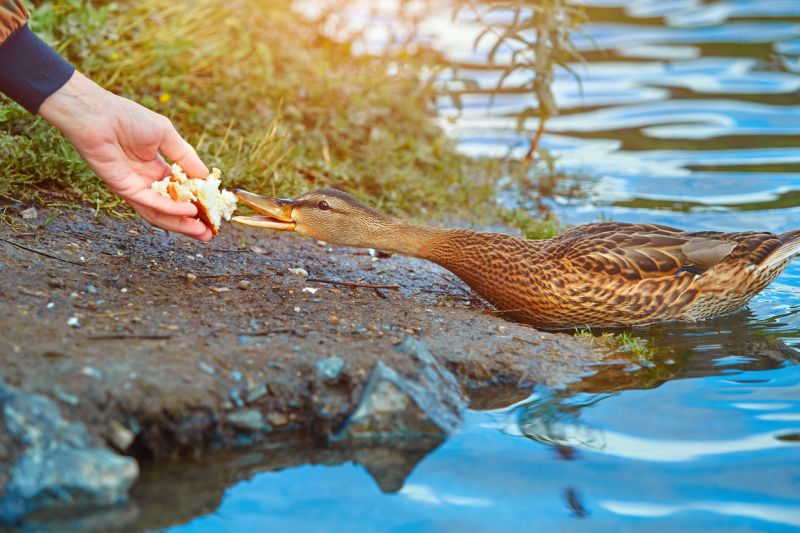
If you see a duck wandering around, you might be tempted to give them whatever food you have with you. It’s common for people to give ducks bread, but as it turns out, that’s a bad idea. Many human foods can be dangerous for ducks, so be cautious about what you feed them, whether they’re wild or domesticated.
Here are foods that ducks should NOT eat:
- Bread
- Onions
- Avocado
- Popcorn
- Nuts
- Citrus
- Potatoes
- Mango
The above items are dangerous fo a variety of reasons. Some are outright poisonous to birds while others are likely to cause allergies.
Bread is on the list because many people think it’s a normal bird food, but it’s very unhealthy. It’s not considered toxic to ducks, but it has no nutritional benefit and it can lead to malnutrition and deformities in large doses. The same is true for similar foods with lots of preservatives, such as chips.
It’s best to never leave human food unattended outside. That way, no animals will accidentally get hurt by consuming it. As cute as ducks are, it’s also best to keep your distance from them. Wild animals aren’t meant to be pet and it might stress them out.
Choosing the Right Duck Feed
There are lots of options when it comes to choosing duck feed. Many keepers choose an all flock feed, which is especially helpful if you’re keeping ducks and chickens together. However, while that food is convenient, it sometimes lacks ideal nutrients for ducks.
For example, it might be suitable for chickens, but it might not have enough vitamin B for ducks. If you aren’t able to buy a feed with more nutrients, you can add some brewer’s yeast to their feed to add extra nutrients. About 1 1/2 teaspoons per cup of feed is ideal.
Unfortunately, duck feed is harder to find and more expensive than chicken feed. So, if you have to, you can use chicken feed to serve to your ducks. Similar to the all flock feed, it will need additional nutrients to keep your ducks in the best shape possible.
Ducks also need access to more water than chickens. Ducks will use extra water to soften their food, which helps them absorb nutrients better. Keeping the water and food separate will prevent it from getting soggy, but you might need to change the food more often than you would with chickens.
As mentioned earlier, you can let your ducks free-range and give them treats in addition to their feed. Some great duck treats include fresh foods like lettuce, kale, broccoli, peas, zucchini, bananas, and watermelon. Treats shouldn’t add up to more than 10% of their daily food intake.
How Often Should You Feed Ducks?
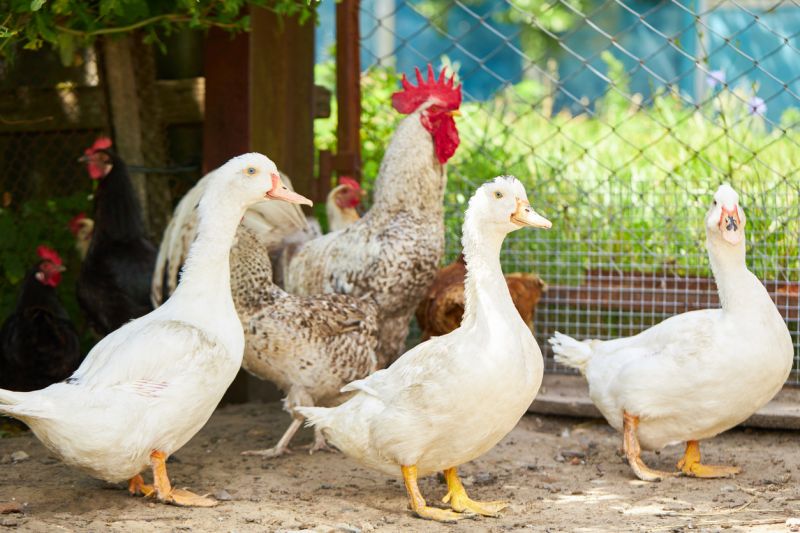
Ducks don’t need meals at scheduled times like a dog or cat might. Instead, they eat throughout almost all hours of the day. As long as the sun is up, they will keep eating their feed and foraging as needed.
Foraging is a big part of a duck’s routine. If they have access to lakes or other bodies of water, you might even notice them foraging at night. While it’s good to let ducks explore and forage during the day, it might be safer to confine them at night to keep them safe from predators.
What Time Should You Feed Ducks?
Domesticated ducks will usually learn to eat on a schedule. You can give them fresh food once in the morning and once in the late afternoon. They will likely eat most of their food when it’s first given to them, and then go off and forage after that.
You can choose the feeding schedule that works best for them, as long as you keep it consistent. Snacks throughout the day is a good addition to their diets too, as long as you don’t overdo it.
Duck Digestive Systems
While ducks eat similarly to chickens, their digestive systems differ a bit. Chickens have a crop, which is an expanding sack that holds food until it moves onto the proventriculus, which is the next step in the chicken digestive process.
Ducks don’t have a crop. However, their esophagus can expand to hold a lot of food. Then, both ducks and chickens have a gizzard, which grinds up food. The gizzard can change sizes to efficiently grind up different types of foods. Items with hard exteriors, such as acorns and crustaceans, will need more grinding power.
A diet with lots of variety is the best way to keep a duck’s digestive system healthy. Ducks that only eat grass will have a small gizzard that doesn’t adapt to expand as much.
Final Thoughts
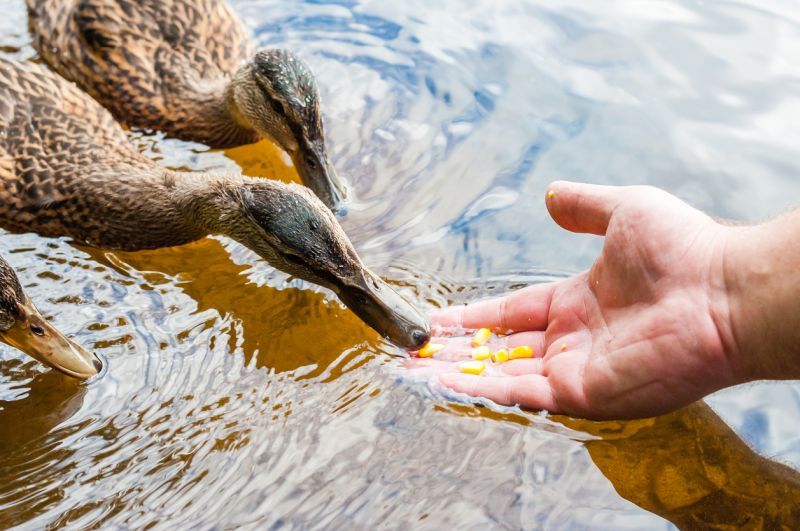
Feeding ducks is similar to feeding chickens. Both require a healthy feed in captivity, along with some time to forage. Foraging is more essential for ducks though, so they need more space and free-range time if possible.
So, it’s up to you to decide which animal is best for you. Behavior-wise, chickens and ducks aren’t too different. Yet, ducks can be a bit more expensive and harder to find. Duck eggs tend to have more benefits than chicken eggs though. Overall, they’re both great birds for eggs, meat, or even just to keep as pets if you’d like.
If you come across ducks in the wild, be careful before feeding them. If you don’t have anything beneficial to give them, then it’s best to leave them be.